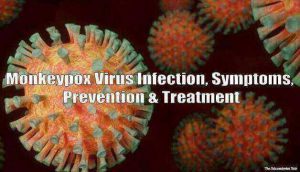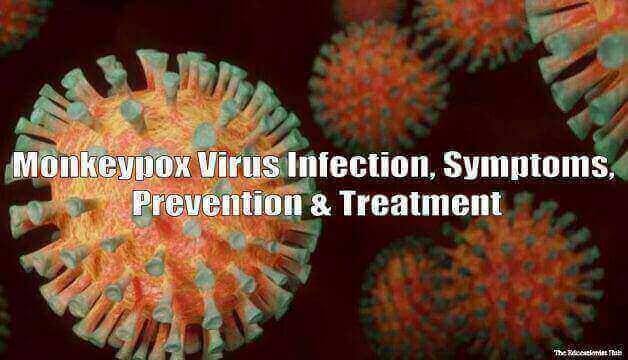Monkeypox Virus Infection, Symptoms, Prevention & Treatment
According to medical records, a person in England who traveled to Nigeria was diagnosed with the monkeypox virus. The UK Health Security Agency has confirmed the presence of a rare viral disease identical to smallpox in a patient. The patient is currently being treated at Guy’s and St Thomas NHS Foundation Trust in London.
What is Monkeypox Virus?
Monkeypox virus is a rare viral disease that has been reported primarily in Central and West Africa. It was originally discovered in 1958 and has been linked to about 11 outbreaks worldwide, including one in the United States in 2003. There are currently at least two distinct genetic types.
What Are The Symptoms of Monkeypox Virus?
Monkeypox virus symptoms begin with a high fever, accompanied by symptoms such as muscle and back pain, chills, fatigue, and enlarged lymph nodes. This is followed by the formation of smallpox lesions, which crust and then fall off.

Symptoms and signs of monkeypox in dogs can range from mild to severe and include fever, cough, eye discharge, lethargy, and swollen lymph nodes, leading to smallpox lesions in the current US outbreak.
PCR tests were first used to diagnose monkeypox.
Samples were taken from a patient showing symptoms of monkeypox and from the patient’s rodent, a prairie dog. According to the sources, the United States reported that confirmed cases of monkeypox were found in Illinois, Indiana, Kansas, Missouri, and Wisconsin.
Monkeypox Virus Infection
In humans, the monkeypox virus is the same as smallpox, except that while monkeypox is related to enlarged lymph nodes (lymphadenopathy), smallpox is not. Symptoms of illness begin about 12 days after exposure and include:
- A high temperature
- Headache
- muscle pain and back pain
- Enlarged lymph nodes
- A general malaise
- Fatigue
A papular rash (raised bumps) usually appears within 1 to 3 days (sometimes longer) after the onset of fever, with pimples most commonly appearing on the face and other parts of the body. The lesions usually go through several stages before they crust over and fall off completely.
Monkeypox Virus Major Symptoms
Monkeypox Symptoms are vague at first, such as a high temperature and excessive sweating, followed by malaise and, in some cases, coughing, nausea, and shortness of breath in some people. A rash with papules and pustules appears two to four days after the onset of the fever. It commonly occurs on the face and chest, but can also affect other parts of the body, including the lining of the nose and mouth.
These smallpox lesions of the skin and mucous membranes may ulcerate, crust, and then begin to heal 14 to 21 days after initial infection. It is also known that the lymph nodes grow during this time. The necrotic nature of certain smallpox lesions can destroy the sebaceous glands, resulting in a smallpox depression or scar, which in the case of monkeypox may gradually become less noticeable over a number of years. There is no evidence of the monkeypox toxemia observed in smallpox.
Also Read: Coronavirus (COVID-19) Explained Simply | Symptoms | Prevention | Latest Updates
Monkeypox Virus Prevention
Several precautions can be taken to avoid infection with the monkeypox virus, including:
- Keep a safe distance between yourself and animals that can transmit the virus.
- You should avoid coming into contact with anything that has come in contact with a sick animal. Includes bedding and other similar items.
- Patients who have become infected should be separated from other people who may be infected.
- Wash your hands thoroughly after handling infectious animals or people. For example, washing hands with soap and water or using an alcohol-based hand sanitizer are effective disinfection methods.
- The use of personal protective equipment (PPE) is essential when caring for patients.
Monkeypox Virus Treatment
There is currently no treatment for monkeypox virus. Smallpox vaccination has been reported to reduce the risk of monkeypox in people who have already been vaccinated in Africa.
Also Read: How COVID Can Infect A Higher Proportion Of Pregnant Women?

